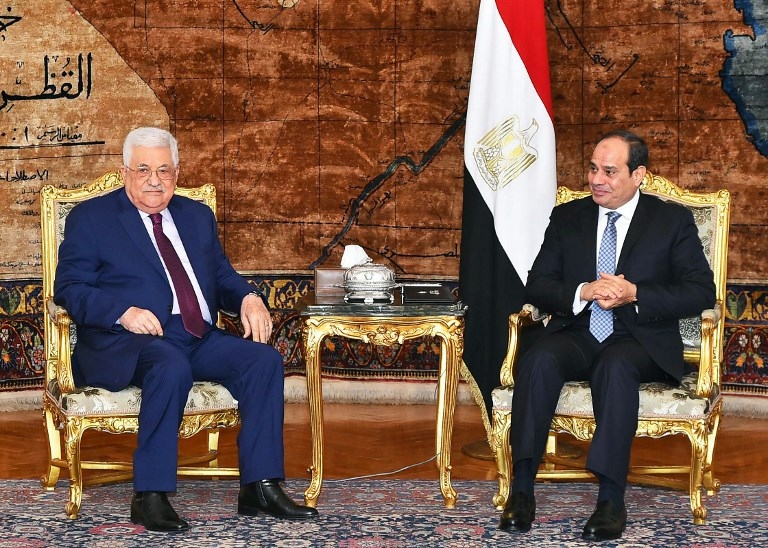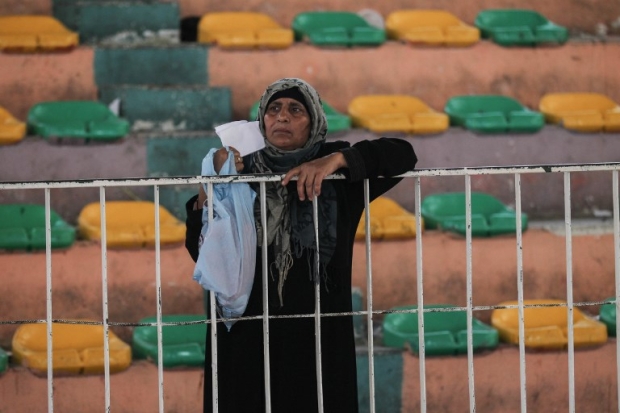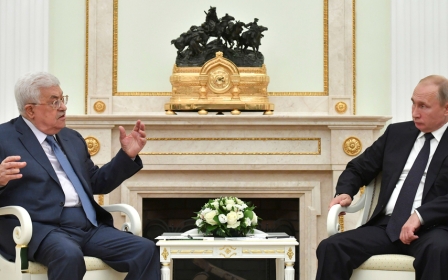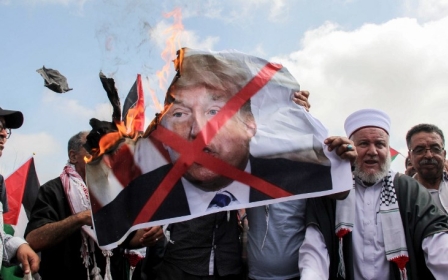'You are playing in our courtyard': PA lashes out at Egypt over Gaza talks

RAMALLAH, Occupied West Bank – After weeks of negotiations, senior Palestinian officials have told Middle East Eye that trust between the Palestinian Authority (PA) and Egypt is "very slim" and they are fed up with Cairo's "intervention in Gaza".
Since July, Egypt has been attempting to reconcile Fatah, which has control of the PA in the West Bank, and Hamas, which controls Gaza, while simultaneously brokering a long-term ceasefire between Hamas and Israel.
Abbas told the Egyptians: you are playing in our courtyard, you are playing in Gaza against the Palestinian national interests
- Fatah official
The US administration, desperate to roll out its so-called "Deal of the Century" and to stabilise Gaza as part of the peace plan, gave Egypt the green light to serve as a mediator – with or without Palestinian Authority President Mahmoud Abbas, a Hamas source said.
That work has continued even as bombs and rockets have been flying over the Gaza border this week, fuelling long-held Egyptian and Israeli fears that further economic and social deterioration in the impoverished coastal strip will spill over into their countries.
Cairo has previously treated the Hamas-Israel conflict as one that could only be resolved once Palestinians were reconciled. Instead, with the US sign-off, Egypt is now ploughing forward with its mediation between Hamas and Israel, and the PA is not happy, three different Fatah officials told MEE.
During a high-ranking Palestinian delegation visit to Cairo earlier this month, Abbas had strong words for his Egyptian counterparts, one official said.
"Abbas told the Egyptians: you are playing in our courtyard, you are playing in Gaza against the Palestinian national interests," said the official.
According to the official, Egypt has since promised to revamp its most recent proposal and is now working on a full package deal that would encompass Palestinian reconciliation, a long-term truce over Gaza and a Hamas-Israel prisoner swap.
Leave the Palestinian issues to the Palestinian leadership
- Jamal Muheisin, Fatah official
Even so, tensions remain. On Sunday, Fatah official Jamal Muheisin told Voice of Palestine radio: "There are some Israeli, American and Arab attempts to have a bilateral agreement between Hamas and Israel," he said.
"Our message to these Arab parties is: leave the Palestinian issues to the Palestinian leadership and don't encourage bilateral agreements between Hamas and Israel that would enhance the division among Palestinians," he said. "No one would accept these attempts."
'Is this what partners do to each other?'
The latest chapter of talks involving Egypt started in mid-July, when Cairo invited Fatah and Hamas for a visit and pitched a reconciliation plan.
The visit came just ahead of a visit by Egyptian intelligence chief Abbas Kamil to Washington, DC.
According to the Fatah sources, the proposal may have been presented by the Egyptians, but in their eyes it had Hamas' fingerprints all over it, and they felt betrayed.
We wondered: where is the strategic relationship between us? Is this what partners do to each other?
- Fatah official
"Our delegation blamed Egypt for selling us a Hamas proposal and for negotiating a unilateral deal between Hamas and Israel," said one Fatah official. "We wondered: where is the strategic relationship between us? Is this what partners do to each other?"
But the Fatah representatives in Cairo held their tongues. They believed Kamil wanted to make progress before his visit to the US in order to leverage Egypt's role and involvement in the "Deal of the Century".
So, to minimise US influence on what they felt were internal Palestinian issues, they waited until the intelligence chief returned to deliver a response.
During a second visit to Cairo in late July, the Fatah delegation – including PA intelligence chief Majid Faraj and Central committee members Azzam al-Ahmad, Rawhi Fatouh and Hussein al-Sheikh – delivered a letter to Kamil.
In the letter, the PA specifically criticised Egypt for:
- reaching an agreement with Hamas over Palestinian reconciliation before presenting it to the PA and then pitching it to the PA as though it were an Egyptian proposal
- negotiating a long-term truce between Hamas in Gaza and Israel without the PA's involvement
- providing Hamas authorities in Gaza with petroleum, gas, cigarettes and other products, depriving the PA of crucial tax revenue.
"We told them [the Egyptians] that the PA pays $118m to Gaza monthly and that was reduced recently to $98m, and such goods used to provide us with some money that contributes to our payments in the Strip," one official said.
After ripping apart the Egyptian proposal, the PA pitched a new one, which would put it in charge of all of Gaza's government institutions overseeing security, taxes, revenues and property.
Plan A, Plan B
In Gaza, Hamas leaders say they have reached an understanding with "mutual interests" with the Egyptians.
"We have mutual interests with Egypt, but at the same time we are trying to bring the Palestinian Authority to Gaza," a senior Hamas official said.
Areas of mutual benefit, according to the official, range from renewing Palestinian reconciliation efforts, executing international humanitarian projects in Gaza and negotiating a truce with Israel.
"If the reconciliation efforts succeed, the Palestinian Authority would run the Gaza Strip, oversee the Rafah crossing [the sole crossing between Gaza and Egypt] and the humanitarian projects coming through the UN, while Egypt will negotiate a long-term truce between Hamas and Israel," he said.
He added: "If the initiative doesn't work, we will go to plan B, which we have agreed on with Egypt, starting from working on a truce between Hamas and Israel, opening the Rafah crossing for people and goods permanently, executing the international humanitarian projects and negotiating a prisoner exchange deal between Hamas and Israel."
The understanding also includes the resumption of security cooperation between Hamas and Egypt in the fight against armed groups in the Sinai, especially the Islamic State.
The Hamas official said Egypt has economic, security and political interests in working in Gaza.
In particular, Egypt wants to restore security ties with the movement, which were severed earlier this year after Cairo failed to fulfil a promise to Hamas.
Egypt had told the movement that if it turned over all of the Gaza crossings with Israel and Egypt to the PA and let the PA collect revenues on the crossings, Cairo would in exchange bring Abbas' government to take over responsibilities and rule in Gaza. In the past, Hamas had agreed to let the PA take over Gaza, but had refused to hand over military forces, an issue which caused talks to break down between the two parties.
So the Egyptian promise wasn't new, but nonetheless Cairo was unable to deliver on it.
Slim trust
After the PA blew up over the first Egyptian proposal and Fatah submitted its demands, Cairo promised to make the preliminary agreement more balanced, one of the Fatah officials said.
Egyptian intelligence chief Kamil invited Azzam al-Ahmad, the head of Fatah's Central Committee, to Cairo last week to deliver this message.
Tensions have flared between the PA and Egypt since President Abdel Fatah el-Sisi came to power and pressured Abbas to reinstate exiled Fatah leader Mohammed Dahlan, according to aides to both Abbas and Dahlan.
Dahlan, the PA's security chief in Gaza prior to Hamas gaining control of the Strip in 2007, has been in exile in Dubai since 2010 and was suspended by Fatah because of his alleged involvement - denied by Dahlan - in a plot to overthrow Abbas.
Relations between the PA and Cairo are now at an all-time low, officials said.
"We will wait and see," one said, "but the trust between Abbas and Egypt is very slim."
This article is available in French on Middle East Eye French edition.
Stay informed with MEE's newsletters
Sign up to get the latest alerts, insights and analysis, starting with Turkey Unpacked
Middle East Eye delivers independent and unrivalled coverage and analysis of the Middle East, North Africa and beyond. To learn more about republishing this content and the associated fees, please fill out this form. More about MEE can be found here.






